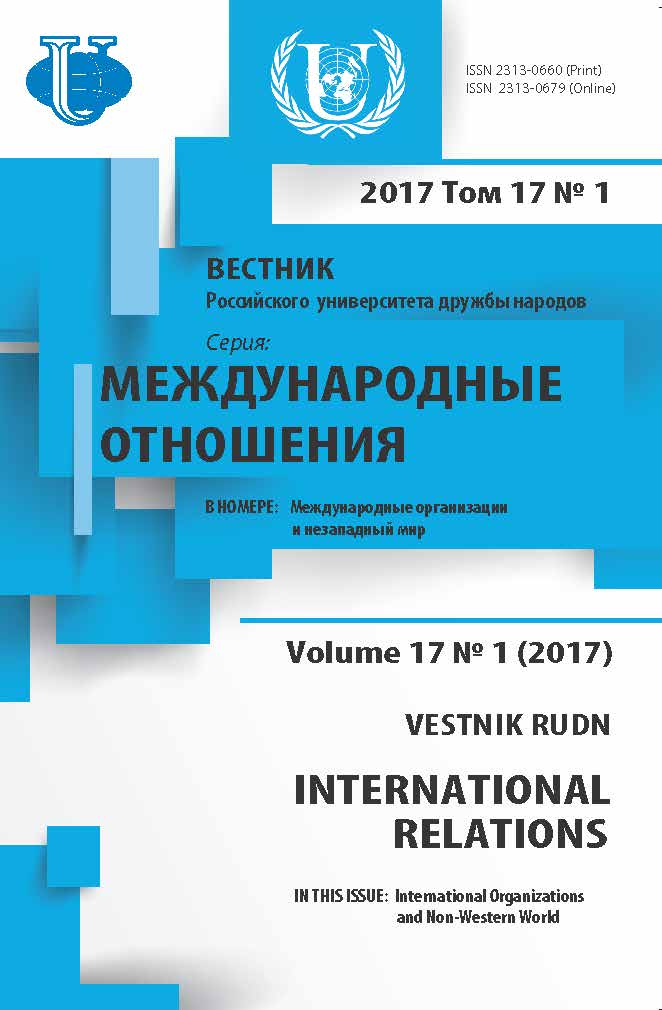“The Soviet delegation considers USSR joining the International Monetary Fund advisable”: Soviet Union and IMF in 1943-1946
- Authors: Minkova K.V.1
-
Affiliations:
- St. Petersburg University
- Issue: Vol 17, No 1 (2017): International organizations and Non-Western World
- Pages: 34-47
- Section: THEMATIC DOSSIER
- URL: https://journals.rudn.ru/international-relations/article/view/15875
- DOI: https://doi.org/10.22363/2313-0660-2017-17-1-34-47
- ID: 15875
Cite item
Full Text
Abstract
The paper based on the Soviet documents previously not included in scientific circulation and little-known American documents focuses on the evolution of the Soviet Government's position in relation to USSR participation in the International Monetary Fund in 1943-1946. The present study is intended not only to close the significant gap in the domestic and foreign historiography, but also to reveal the true attitude of the Soviet government to international economic cooperation, greatly distorted in the 1950s-1980s by both Soviet and Western propaganda. Stemming from principles of historicism and scientific objectivity, having carefully analyzed Soviet documents and compared them with those of the U.S., the author concludes that in the initial phase of post-war international economic and trade cooperation the Soviet government attached great importance to the participation of the Soviet Union in the formulation of the principles of this cooperation and was ready to make significant concessions for the opportunity to work on the formation of international economic policy and maintain the image of an influential actor in the international arena. However, in the autumn of 1945 the Soviet government's position began to change due to the multiplicity of reasons of exclusively political nature. In particular, the Soviet Union was drawn into a big economic and political game between Washington and London, which resulted in false premises for all Soviet representations of participation in international economic cooperation in late 1945 and early 1946 and, consequently, all decision taken by the Soviet leadership. This fact has become one of the key reasons for the refusal of the USSR to join the IMF in that period.
Keywords
About the authors
Kristina Vladimirovna Minkova
St. Petersburg University
Author for correspondence.
Email: kristina_minkova@mail.ru
St. Petersburg, Russia
References
- Brabant, J. M. (1991). The Planned Economies and International Economic Organizations. Cambridge: Cambridge University Press.
- Gaddis, J. L. (1972). The United States and the Origins of the Cold War, 1941—1947. New York: Columbia University Press.
- Halm, G. N. (1945). International Monetary Cooperation. Chapel Hill: The University of North Carolina Press.
- Harold, J. (1996). International Monetary Co-operation Since Bretton Woods. IMF: Oxford University Press.
- Harrison, M. (1998). The Economics of World War II: An Overview. In: Harrison M., ed. The Economics of World War II: Six Great Powers in International Comparison. Cambridge: Cambridge University Press. P. 1—42.
- Hawtrey, R. G. (1946). Bretton Woods: For Better or For Worse. London: Longmans, Green and Co.
- Helleiner, E. (2014). Forgotten Foundations of Bretton Woods. Ithaca: Cornell University Press.
- Hexner, E. (1946). The Soviet Union and the International Monetary Fund. The American Journal of International Law, 40(3), 637—640.
- Ikenberry, G. J. (1993). The Political Origins of Bretton Woods. In: Bordo M.D., Eichengreen D., eds. A Retrospective on the Bretton Woods System: Lessons for International Monetary Reform. Chicago: University of Chicago Press. P. 155—198.
- James, H., & James, M. (1994). The Origins of the Cold War: Some New Documents. The Historical Journal, 37(3), 615—622.
- Lavigne, M. (1990). Organized International Economic Cooperation After World War II. Soviet and Eastern European Foreign Trade, 26(1), 4—35.
- Lopatin, G. S. (Ed.) (1964). International Monetary Fund. Moscow: Mezhdunarodnye otnosheniya. (In Russ.).
- Minkova, K. V. (2006). International Multilateral Trade: From Antiquity to WTO. St. Petersburg: St. Petersburg University Press. (In Russ.).
- Mikesell, R. F. (1951). Negotiating at Bretton Woods, 1944. In: Dennett R., Johnson J. E., editors. Negotiating with the Russians. Boston: World Peace Foundation. P. 101—116.
- Pollard, R. (1985). Economic Security and the Origins of the Cold War, 1945—1950. New York, Columbia University Press.
- Van Dormael, A. (1978). Bretton Woods: Birth of a Monetary System. New York: Holmes&Meier.
Supplementary files










